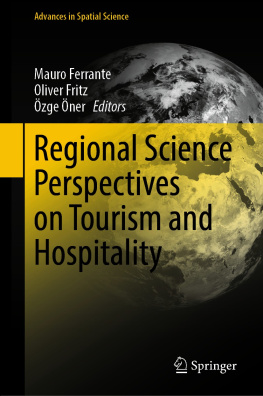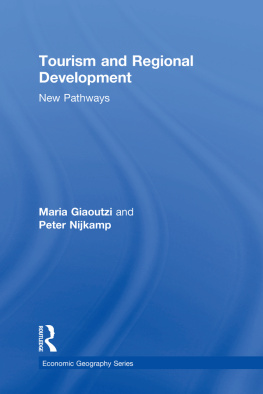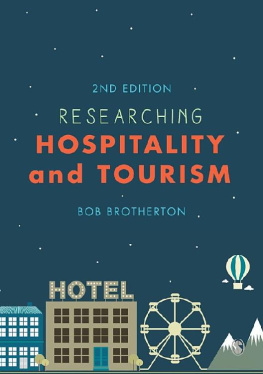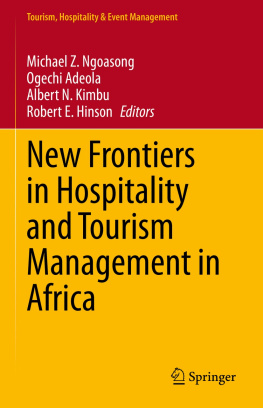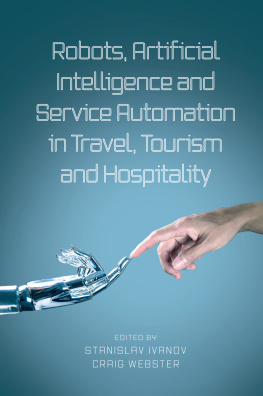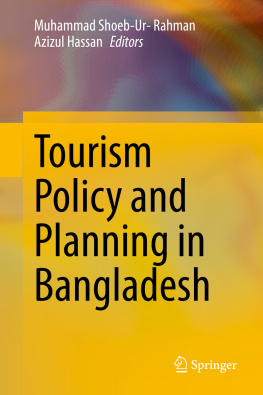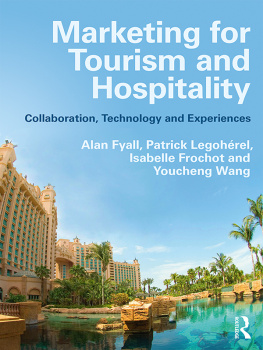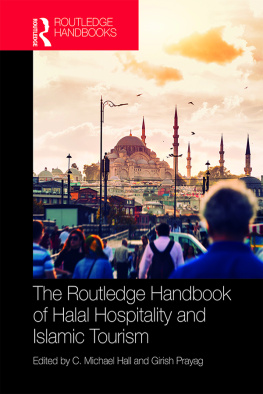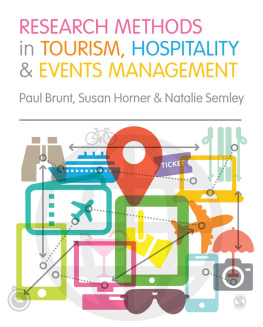Regional Science Perspectives on Tourism and Hospitality
Here you can read online Regional Science Perspectives on Tourism and Hospitality full text of the book (entire story) in english for free. Download pdf and epub, get meaning, cover and reviews about this ebook. year: 2021, genre: Politics. Description of the work, (preface) as well as reviews are available. Best literature library LitArk.com created for fans of good reading and offers a wide selection of genres:
Romance novel
Science fiction
Adventure
Detective
Science
History
Home and family
Prose
Art
Politics
Computer
Non-fiction
Religion
Business
Children
Humor
Choose a favorite category and find really read worthwhile books. Enjoy immersion in the world of imagination, feel the emotions of the characters or learn something new for yourself, make an fascinating discovery.
Regional Science Perspectives on Tourism and Hospitality: summary, description and annotation
We offer to read an annotation, description, summary or preface (depends on what the author of the book "Regional Science Perspectives on Tourism and Hospitality" wrote himself). If you haven't found the necessary information about the book — write in the comments, we will try to find it.
Unknown: author's other books
Who wrote Regional Science Perspectives on Tourism and Hospitality? Find out the surname, the name of the author of the book and a list of all author's works by series.
Regional Science Perspectives on Tourism and Hospitality — read online for free the complete book (whole text) full work
Below is the text of the book, divided by pages. System saving the place of the last page read, allows you to conveniently read the book "Regional Science Perspectives on Tourism and Hospitality" online for free, without having to search again every time where you left off. Put a bookmark, and you can go to the page where you finished reading at any time.
Font size:
Interval:
Bookmark:
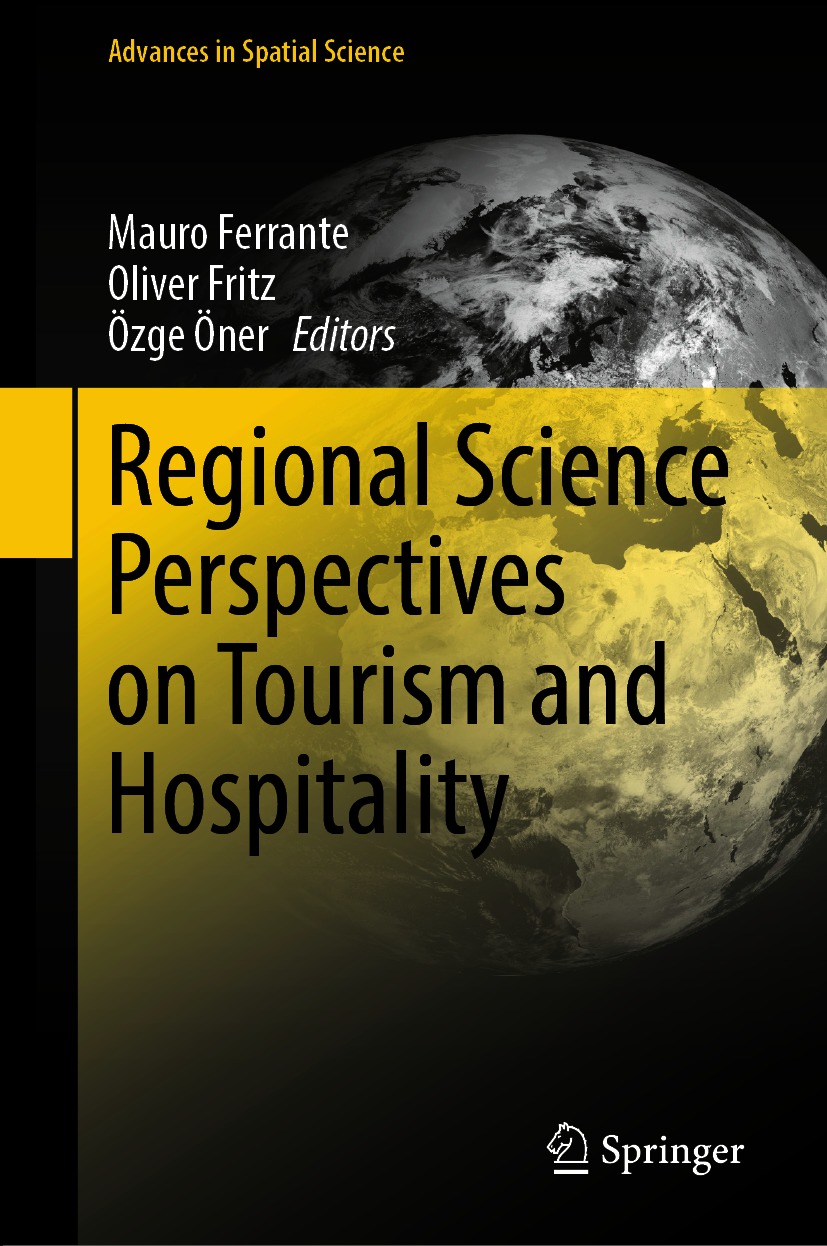
This series contains scientific studies focusing on spatial phenomena, utilising theoretical frameworks, analytical methods, and empirical procedures specifically designed for spatial analysis. Advances in Spatial Science brings together innovative spatial research utilising concepts, perspectives, and methods relevant to both basic science and policy making. The aim is to present advances in spatial science to an informed readership in universities, research organisations, and policy-making institutions throughout the world. The type of material considered for publication in the series includes: Monographs of theoretical and applied research in spatial science; state-of-the-art volumes in areas of basic research; reports of innovative theories and methods in spatial science; tightly edited reports from specially organised research seminars.
The series and the volumes published in it are indexed by Scopus.
More information about this series at http://www.springer.com/series/3302

This Springer imprint is published by the registered company Springer Nature Switzerland AG
The registered company address is: Gewerbestrasse 11, 6330 Cham, Switzerland
This book is dedicated to our dear friend and mentor, Il padrino Prof. Geoffrey J. D. Hewings, founder and erstwhile Director of the Regional Economics Applications Laboratory at the University of Illinois, Urbana-Champaign. Over many years, Geoff inspired numerous students and scholars all around the world. Our debt to him is considerable: not only in encouraging our devotion to the pursuit of knowledge but also in inculcating a team spirit. Whilst spending parts of their academic lives at REAL in different periods of time, the three Co-editors of this book have been able to forge a friendship which has nurtured a long-lasting collaborative effort: the dedication of a true mentor.
Regional science (RS) has evolved and developed into a rigorous area since the seminal study by Isard (1956) that is often cited as one of the foundation stones upon the area was built. From a geographical perspective, Tomaney (2020: 231) highlighted the changing features of RS in the late 1960s and early 1970s, particularly in response to the criticisms of the positivism tradition posed by behavioural scientists (Johnston and Sidaway 2015). Vaz (2020) described these distinctive features of RS arguing that as a positivist approach, regional science uses spatial analysis as a proxy to validate spatial findings (Vaz 2020: 359). Yet the unifying focus of RSthe region, is no longer just the preserve of geographers and economists, despite the rich history of scholarly endeavour since antiquity focused on regional description and analysis (Johnston and Sidaway 2015). RS focus on the region has a preoccupation with administrative boundaries and the use of data at different spatial scales to address spatial problems in a regional setting although we must also recognize that many boundaries are exogenously determined and so the researcher has to work with the data generated for this purpose. The analysis of spatial phenomena at different scales within the region has implicitly meant regional science is positivist in its epistemological orientation, mathematical and statistical in its methods, and displays a proclivity to model and forecast data to better understand spatial interactions, locational dynamics and regional processes and trends (Vaz 2020: 358). Despite the shifts in the 1970s away from positivism in spatial research as a dominant paradigm, the academy maintained an active commitment to regional science scholarship in journals such as Papers in Regional Science (which is the official journal of the Regional Science Association International that published its first issue in 1955), Regional Studies, the Journal of Regional Science and the Annals of Regional Science. A number of newer journals have also been established illustrating the continued academic health of the subject. But how has this tradition of RS research impacted upon tourism and hospitality?
A sustained interest in RS within the broader domain of leisure and tourism can be discovered from the 1970s onwards, with reference to Tourism in the journal Regional Studies in the very early issues in the late 1960s and early 1970s, for example. As a geographer, I have always taken the RS perspective for granted in over 20 years of tracing the evolution of the geography of tourism and recreation (Hall and Page 1999, 2014). When one looks at the seminal studies such as Coppocks (1977) edited collectionTourism: A Tool for Regional Development, it was an important milestone as were the early texts on tourism geography (e.g. Pearce 1981; Mathieson and Wall 1982) which demonstrated the rich tradition of regional spatial analysis of tourism and recreation. These studies embraced the regional analytical approach, using spatial data to depict tourism and leisure phenomena and to derive generalisations from the findings. Indeed, this book represents the ongoing trajectory of RS applications to tourism and hospitality, which is evident in the top-rated tourism journals (e.g.
Font size:
Interval:
Bookmark:
Similar books «Regional Science Perspectives on Tourism and Hospitality»
Look at similar books to Regional Science Perspectives on Tourism and Hospitality. We have selected literature similar in name and meaning in the hope of providing readers with more options to find new, interesting, not yet read works.
Discussion, reviews of the book Regional Science Perspectives on Tourism and Hospitality and just readers' own opinions. Leave your comments, write what you think about the work, its meaning or the main characters. Specify what exactly you liked and what you didn't like, and why you think so.

